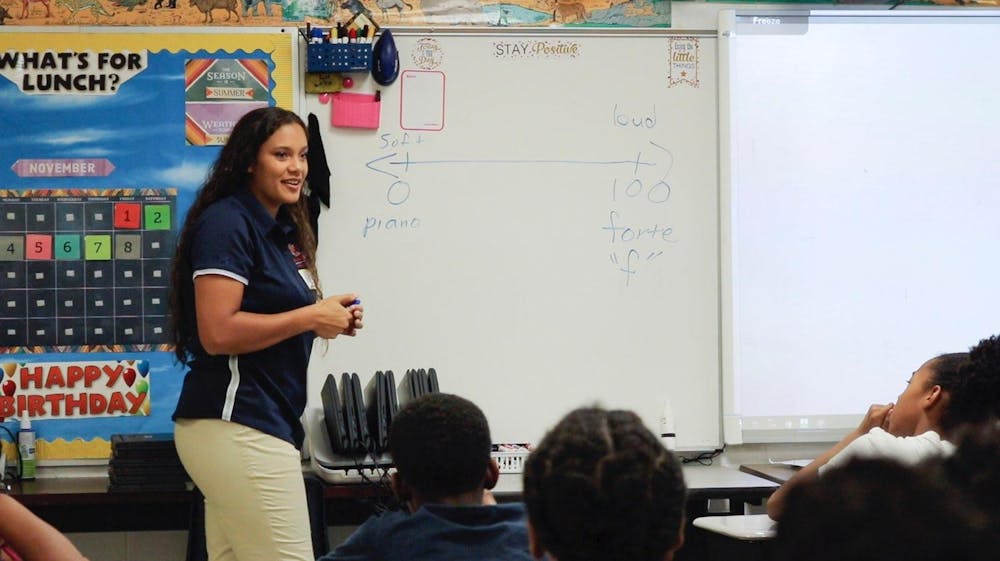A few Auburn music education students feel that a public school without a music class would be flat in its course of study. Loachapoka Elementary was without a music class until late last spring, and it was those Auburn students who stepped in to enrich their curriculum.
“Last spring we initiated a program at Loachapoka,” said Jackson Tucker, freshman in music education. “We have our music education students go over and teach a 30- to 45-minute lesson.”
This semester, the program was in need of new instruments so student instructors could introduce new lesson plans. Tiger Giving Day supporters raised $16,605 to see that happen.
“We needed ukuleles, and we’re trying to get slap-top cajons so they have a percussion instrument to play,” Tucker said. “We were lucky enough to have some new ones shipped from Africa last year.”
Auburn students visit the school every Friday morning to teach classes focusing on various groups of instruments from around the world to provide a diverse education. The program not only benefits Loachapoka’s children, but also provides the Auburn students with first-hand teaching experience.
“The other schools have an art teacher that comes out and works with [them],” said Natasha Foster, principal of Loachapoka Elementary School. “We were trying to collaborate on how we could get some music in the school and help the College of Education out [by having] their students get a little experience in working with the elementary school.”
Foster said her school hopes to continue its partnership with the University for the next three to five years, with the eventual goal of hiring a permanent music teacher. The school would like to secure a grant with the assistance of the Lee County School District and the University to create the position for a daily class.
“I’m prayerful that it will be [a recent Auburn graduate] and somebody that’s actually been through this program,” Foster said. “Someone with good experience and relationships here with the students.”
Each group of Auburn music education students develop their own lesson plan based on grade level and previous knowledge of music. Some students work with band students at Loachapoka High School as well, according to Tucker.
“Since we started last year, our third graders had music education last spring, but our second graders that I have did not,” Tucker said. “We’re having to start from the beginning with rhythm and steady beat. Next week, we’re moving into singing, but I know the fourth graders moved into playing recorder because they learned all the notation of all the music.”
Kathy King, assistant clinical professor for the College of Education, and Jane Kuehne, assistant professor of the program, launched the partnership with the previous principal of the school to give children a fun class that prepared them for higher-level music, Tucker said.
The classes also provide children with an outlet that might otherwise be unavailable to them, Foster said. She noted the price that comes with personal instruction.
“We’re a Title I school, so most of our students won’t get private lessons,” she said. “[The Auburn students] push into each classroom and we have two [Auburn] students per classroom. We’re getting music in as early as kindergarten now.”
One advantage of the classes is Auburn students can incorporate them into their own degree without the need to commit to an internship, which can take until junior year for some majors to reach.
“We had some people that weren’t sure if they wanted to teach kids, and this kind of reassured them that that’s what they wanted to do with their career,” Tucker said. “They didn’t want to teach private lessons to college kids; they wanted to get out to elementary and high schools.”
The Tiger Giving Day project went over its $15,000 target, and some funding may be used in purchasing innovative instruments such as touch-tone keyboards for the next school semester.
“[With those,] you can just plug a node into a vegetable and you can hit it and it’ll play a note,” he said.
Tucker said he is confident in his own dreams of seeing children become musically inclined because of his participation in the program.
“It’s very exciting seeing [students] light up when we walk in the door,” he said. “I had one student who saw me at the door run and say, ‘We’re having music today!’”
He said he is pleased to know the impact music can bring to an underfunded school like Loachapoka Elementary, something he is aware of from his own background.
“My grandmother taught math in a Title I school for 28 years, and so I’ve seen firsthand children who didn’t have music growing up in those underfunded community schools,” Tucker said. “I’ve seen the impact in how these kids are more involved in the classroom. When they play music in P.E. and they run around, they will stomp to the quarter note, and it’s great seeing they’re applying music in other facets of their life.”
Do you like this story? The Plainsman doesn't accept money from tuition or student fees, and we don't charge a subscription fee. But you can donate to support The Plainsman.





